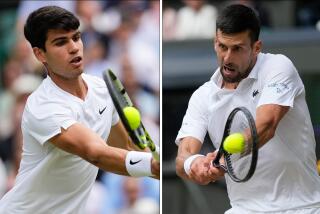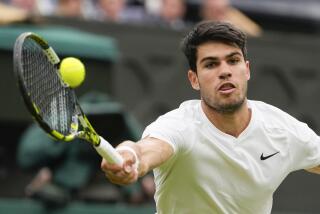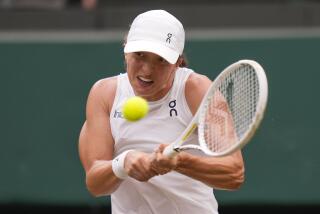WIMBLEDON ’87 : Doohan Is In . . . and Becker Is Out : Australian Upsets Two-Time Winner in Second Round
- Share via
WIMBLEDON, England — Boris Becker has lost at Wimbledon.
What now? Do the Lords of Wimbledon roll up the lawns and send everyone home a week early, the party ruined? Or do they simply paint the balls mourning black and try to carry on, stiff upper lips, with the cocktail flags at half-mast?
Nobody knows, because it wasn’t supposed to happen this way. Boris Becker, seeded No. 1, the champion in 1985 and ‘86, was not supposed to lose in the second round of the tournament to a two-legged piece of cannon-fodder named Peter Doohan.
But mighty Boris struck out Friday afternoon on No. 1 Court, outslugged by the unknown Australian, 7-6, 4-6, 6-2, 6-4.
The biggest upset in Wimbledon history? Name a bigger one, a more surprising one. Maybe defending champion Manuel Santana losing to Charles Pasarell in the first round in ‘67? Naaah. Several people at the time had heard of Pasarell. Maybe Roger Taylor over Rod Laver in ’70 in the round of 16? Naaah. Taylor was a seeded player.
This was King Boris losing to John Doe.
“I did what I had to do, I cannot do more,” Becker said, shrugging off the epic upset.
Another bolt of Wimbledon lightning was narrowly averted Friday when Ivan Lendl battled back for a 3-6, 7-6, 6-7, 7-5, 6-1 win over Italian hotdog Paolo Cane.
Lendl, of course, was supposed to struggle on the Wimbledon grass. But Becker? Wimbledon is his joy, his home.
So strong is Becker’s identification with this tournament that when his representatives went to the Soviet Union recently to arrange a series of exhibition matches, the Soviet Minister of Sport said, “Becker? Ah, yes, the English player.”
Boris is German, of course, but his home has become Wimbledon. He has an enormous following here. He is the most popular player at Wimbledon since Bjorn Borg.
In two years, Becker has developed his very own Wimbledon mystique. He had won 15 straight matches here, the only loss coming in 1984, at the age of 16, when he injured an ankle and was carried off the court on a stretcher.
So strong was Becker’s affinity with the green, green grass of Wimbledon that last year and this year, upon first arriving in town, he went immediately to Centre Court, alone, and stood surveying his domain.
“I feel I belong here,” Becker had said. “Wimbledon completely changed my life.”
Friday, the 2-year-old Becker Dynasty crumbled, and he was swept off the court like the daily grass clippings.
However, overtones of Greek tragedy were averted by Becker himself, who closed his post-match press conference with the assurance, “I’ll give it a shot next year.”
Then he smiled slightly. “I’m not even 20.”
Still, until Friday, his grass game was ageless and seemingly unbeatable. What happened?
Becker and Doohan--remember him, the winner?--agreed that the turning point came at the beginning of the third set. Becker had taken the previous set by breaking Doohan’s serve in the final game, the first service break of the match.
Then Doohan, who was either too old or too naive or too numb to submit to the pressure of the situation, broke Becker to open the third set and went on to win the set, 6-2.
“I broke him and I started to feel better,” Becker said. “But he broke me right back.”
Said Doohan: “I think that really surprised him.”
Surprise was the operative word of the day. The weather was a surprise: It didn’t rain.
Another surprise: In the opening game, Becker had Doohan 40-love and Doohan knocked out five straight winners to take the game. Is this the way champions begin a match, letting the underdog get his confidence up?
The big surprise: Doohan himself. He played Becker a week ago in a Wimbledon warm-up tournament at Queen’s Club , and Becker won easily, 6-4, 6-2. Doohan started the year 301st on the computer rankings, but had worked his way up to 70th by Wimbledon time. He figured to be nothing more than a decent workout for Becker.
All anyone knew about Doohan was in his short bio in the press guide. He’s a 26-year-old journeyman from Newcastle, Australia, who played tennis at the University of Arkansas.
He’s also 6-foot-3. Somebody should have seen the danger signs. Australian player, raised on grass courts, tall and strong, big serve, the perfect profile of a Wimbledon upsetter.
“Guys from Australia,” said former Wimbledon champion Arthur Ashe, shaking his head. “All Australians can play on grass. He grew up on the stuff.”
There were other hints of impending Becker doom. Henri Leconte, the French player, was going around all week telling people Becker’s serve was less imposing than last year.
Doohan certainly found it returnable. The serves of Becker, which once so routinely evaded the heart of opponents’ rackets, became meat-seeking missiles.
“At Queen’s, I couldn’t get any of his serves back,” Doohan said. “Today I was getting maybe 70, 80% of his serves back.”
The weather seemed to help Doohan. There was no rain, and the sun appeared often enough to harden up the spongy grass.
“The courts at Queen’s were green and sloppy,” Doohan said. “Today I had better footing. I could get out and get the serve back, give him a low volley.”
Indeed, the big serve of this match belonged to Boom Boom Doohan, who had 37 service winners to Becker’s 21.
“I’d definitely play him different, especially on my return,” Becker said when asked to second-guess his own strategy. “On Court No. 1, if you go back (from the base line when receiving serve), the court goes (slopes) down.”
Becker’s manager, Ion Tiriac, agreed.
“The only thing I would have done different would be change his position on return,” Tiriac said. “I’d move him a half-step back, it would give him more time.”
But maybe it wouldn’t have made a difference. The element of magic cannot be overcome by simple strategy.
“The second set was like magic,” Becker said. “He was guessing everything right. I was hitting one way, he would guess that way, he was guessing a lob, I was hitting lob. He couldn’t miss, the guy.”
Doohan admitted he had an almost eerie feeling for Becker’s game, especially Boris’ serves.
“After a while you get a feeling where his ball is going to go (on the serve), a sixth sense,” Doohan said. “Maybe it’s just a few inches on the ball toss. . . . A pattern starts to emerge.”
The pattern that emerged early was Becker’s frustration. The famed Becker on-court joie de vivre , the gusto and spirit that made him a folk hero to Wimbledon fans, faded fast.
His anxiety was evident from early on. He looked puzzled at times, and angry at others. During the third set, he disliked one call and approached the umpire’s chair, calling out loudly, “This is a very important match. Don’t make so many mistakes.”
Boris should have heeded his own advice.
Certainly he had no excuses, although he did note that the rainy weather had limited his practice time.
But Boris came to Wimbledon in top shape, stronger and quicker than ever in his young life, supremely confident. In his opening match, a straight-set win, he even slapped a winner left-handed.
He had no distractions. Tiriac sent Boris’ girlfriend, Benedictine Courtin, back to Monaco.
Asked about that bit of strategy late Friday, Tiriac said curtly, “That’s not my department.”
But you get the picture, the young man was well taken care of. All Becker had to do here was show up and play. Tiriac took care of all else.
“If I have to wash the underpants of Boris Becker and that will help him play better tennis, then I’m going to do it,” Tiriac said.
Maybe Tiriac also should have done some advance scouting of the early-round nobodies on Becker’s Wimbledon dance card, because Doohan’s play came as a surprise to Becker.
“I beat (Tim) Mayotte and (Kevin) Curren on grass,” Doohan said. “Maybe he (Becker) doesn’t know that.”
Maybe not.
“I didn’t think Doohan could play like he did today,” Becker said. “I kept thinking he cannot volley like this, he cannot serve like this, he cannot play like this. He’s going to crack and I win easy. He’s not a Lendl, a Leconte, who can play like that. I didn’t think he was that good, so I wasn’t going for as much winners.”
Before the match, and early on, the only two people in the stadium who seemed not to share a feeling of Becker invincibility were Becker and Doohan.
“I am not immortal,” Becker said modestly. “I have to lose, I knew that the day’s going to come.”
But in the second round of Wimbledon, against Peter Who?han?
“I’ll probably feel worse tomorrow morning,” Becker said. “Probably now I don’t realize what I did. Tomorrow morning when I wake up, it’s going to hurt even worse.”
Becker handled several post-match media interviews graciously and patiently.
“He’s a breath of fresh air,” said Arthur Ashe, who interviewed Becker for HBO. “No, he’s a gale of fresh air.”
But today, Becker is blowing town.
The tournament will stagger on, with Lendl perched precariously in the driver’s seat.
Lendl left the court Thursday when his match with Cane was halted by rain at 5-5 in the second set, Lendl having lost the first set, 6-3.
Lendl unwound Thursday night by playing slot-cars with a friend, and when tennis play resumed Friday, Lendl quickly evened the match, winning a 7-5 tiebreaker. But Cane broke Lendl’s serve in the seventh game of the fourth set to take a 4-3 lead.
Lendl broke back immediately, and went on to win the set when Cane double-faulted twice in the final game, a game which Lendl finished with a hard cross-court service return.
The match was a study in contrasting personalities. Lendl, other than one or two stern admonitions to himself, kept under control. Cane was all over the court. He questioned officials on almost every close call, once smacking the net with his racket in anger, once hitting a courtside pipe and drawing a warning.
Cane, known for his theatrics, talked to himself and the crowd almost constantly. Lendl was not entertained.
“I do not especially like Cane,” Lendl said. “He tries to cheat, as he did in Italy. You saw it here. Every time a ball is close, he goes up and argues. At the end of the first set, I said to him that he should stop crying and play some tennis. It was getting ridiculous.”
If Lendl thinks that was ridiculous, he should have seen what was going on next door on No. 1 Court.
More to Read
Go beyond the scoreboard
Get the latest on L.A.'s teams in the daily Sports Report newsletter.
You may occasionally receive promotional content from the Los Angeles Times.










